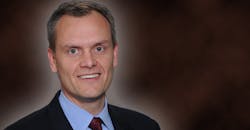Honeywell CEO Seeks Wall Street Darling Status That Eluded Cote
Honeywell International Inc.’s new CEO is determined to take the company where predecessor Dave Cote couldn’t: a premium valuation from Wall Street.
Almost eight months into the job, Darius Adamczyk, Cote’s hand-picked successor, is taking action to address what investors say are the reasons Honeywell has been unable to crack a select group of industrial companies that command higher share prices relative to earnings.
To get there, Adamczyk must clear several hurdles. Honeywell’s sales growth has lagged behind its peers, and it has an uneven record on returning profits to shareholders and converting cash into earnings. Adamczyk, 51, who spoke only a few words of English when he came to the U.S. from Poland at age 11, says he is working on all three.
“Those are the big levers that are going to continue to enable us to get that premium multiple,” Adamczyk said in an interview at Bloomberg headquarters in New York on Thursday. He cited the company’s earnings per share, which he said have been among the highest in the industry. “I absolutely want the premium multiple, but I also want to continue to expand EPS and grow faster than the market.”
Adamczyk declined to set a time frame or for a higher valuation, saying, “I don’t know if that’s next month, next quarter or five years from now.”
The CEO’s plans to spin off two business units by the end of next year lays the groundwork for cracking one of his toughest challenges -- revving up the pace of sales. He’s pledged to be more aggressive on using the company’s cash reserves and to reduce items such as inventory and receivables that affect the bottom line.
“Those are things that certainly seem front of mind with Darius,” said Jason Adams, U.S. industrial analyst at T. Rowe Price Group. “There really does seem to be the potential to take this company to an even higher level.”
Cote’s Shoes
Shareholders heaped praise on Cote for taking Honeywell from the brink of failure in 2001 to steady earnings growth of about 10% while expanding profit margins. But that turnaround wasn’t enough to boost the stock to an elite level. Honeywell’s share price trades at 19 times earnings while 3M Co. has a P/E ratio of 27 times and Illinois Tool Works Inc. is at 25 times.
That’s a lot of value left on the table. If Morris Plains, New Jersey-based Honeywell traded at 25 times its trailing 12-month earnings, the stock would be about 30% higher than close on Nov. 15 of $146.37.
Adamczyk, who has an electrical and computer-engineering degree from Michigan State University and a Harvard MBA, caught Cote’s eye as a rising star in 2008 when Honeywell bought Metrologic, a maker of data-collection hardware and software. Investors including Elliott Management Corp., had hired Adamczyk as Metrologic’s CEO to help the company’s founder boost profit.
Honeywell persuaded Adamczyk to stay on board and help combine Metrologic with a maker of hand-held computers that had been acquired a year earlier. Cote put him in charge of Honeywell’s process-automation unit in 2012, and then two years later made him chief of the performance-materials and technologies unit, one of four reporting segments. Adamczyk was named chief operating officer a year before becoming CEO on March 31.
Two Spinoffs
In his first major move as CEO, Adamczyk announced last month that Honeywell would spin off the turbocharger business as well as the unit that makes home products such as air purifiers, smoke alarms, carbon monoxide detectors and thermostats. Honeywell will be left with faster-growing businesses but will lose almost 20 percent of its $40 billion in annual sales.
Pressure will mount on Adamczyk to make acquisitions to replace those sales, said David Berge, an analyst with Moody’s Investors Service. That may be tough at a time when high valuations have pushed up the price on takeover targets. Adamczyk has pledged to adopt Cote’s conservative financial criteria for determining whether a company is worth the purchase price.
“You can’t stand still on a company like this,” Berge said. “Major conglomerates have to be moving. Otherwise, you’re going to invite activism and all sorts of critique. They sort of put their own feet to the fire.”
A push toward a higher valuation can lead to tradeoffs. An effort to boost sales growth often requires more investment in new-product development and a larger salesforce, which can curb improvement in profit margins. The drive to covert more cash into earnings is at odds with spending more on a new factory or equipment, which in the medium term would help increase sales.
Adamczyk said Honeywell is open to giving more capital to shareholders through buybacks if it can’t find suitable acquisitions. He said he doesn’t feel compelled to make large deals on the scale of United Technologies Corp. buying Rockwell Collins Inc. or Emerson Electric Co. pursuing Rockwell Automation Inc.
“We don’t always get all the headlines, which is perfectly fine with us,” he said. “What we want to do is to continue to be very consistent in our approach and deliver it and do what we say we’re going to do.”
By Thomas Black
About the Author
Bloomberg
Licensed content from Bloomberg, copyright 2016.
